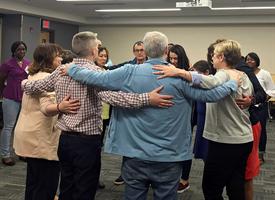Theatre and Medicine - An Unlikely Pairing Addresses Oppression and Bias

Can a theatre workshop help medical faculty do their jobs more effectively? Faculty, students, residents and members of senior leadership learned the answer to this question at a recent event hosted by the Division of Medical Humanities.
Katherine Burke is an international expert on Theatre of the Oppressed and forum theatre, which uses theatre to help facilitate cultural change. These activities allow participants to both act out scenes and watch the scenes unfold, stopping and changing the performance when they see an opportunity to explore issues related to bias and social injustice.
According to Margie Shaw, associate professor of Medical Humanities and Bioethics and one of the hosts of the event, the workshop harnessed the power of the humanities and arts to create dialogue, thoughtfulness and awareness. Although some people feel confident in their ability to speak up against discrimination and bias, bystanders often find themselves unsure of how to act. This can lead them to feeling morally distressed for remaining silent.
“Workshops like these provide our faculty, staff, trainees and students with practical skills that reflect the lessons learned from our broader institutional diversity and inclusion education initiatives,” said Linda Chaudron, associate vice president and senior associate dean for Inclusion and Culture Development. “Policies help us prevent and respond to instances of bias and discrimination while these hands-on workshops teach attendees how to respond if they witness or experience something they know isn’t in alignment with URMC’s values.”
Shaw and Adrienne Morgan, assistant dean for Medical Education Diversity and Inclusion, collaborated with the Office for Inclusion and Culture Development, as well as the Division of Medical Humanities and Bioethics, Institute for Innovative Education, Office for Faculty Development and Diversity and Schyve Center for Bioethics to put on this event.
Exploring solutions to real-life dilemmas
During the workshop, attendees were asked to build a “still image” using their bodies that represented the culture of URMC. Without direction, the group formed a circle by linking their arms – an image of support and unity. However, not everyone was included in the supportive circle. Those participants who were not Caucasian or who had a disability were left outside the circle, disconnected and alone.
“That was probably one of the most uncomfortable Saturdays that I’ve ever spent but it needed to be,” said Patrick Hopkins, co-director of Baccalaureate Programs and assistant professor of Clinical Nursing, who attended the event. “The workshop was powerful in helping us explore issues that are prevalent in our society at the moment.”
Though as Shaw pointed out, “this day was about confronting things that need to change – not just focusing on what’s good.”
It is this willingness to focus on the need for change that has spurred URMC to create plans to foster equality and inclusiveness in recent months. Giving faculty, staff and students a similar outlet to express feelings of oppression, discrimination and bias makes this workshop powerful but “this workshop alone doesn’t help anything,” says Shaw. “Its leaders reaching out and requesting these sessions be presented to their department that will facilitate change. Wide implementation is the key. Policies are not enough – they don’t give people the skills to act when faced with bias or discrimination.”
Policies must be coupled with practical training on how to act in the face of discrimination and that means acknowledging the strengths of our institution, as well as areas we still need to grow.
If you are interested in holding a Theatre of the Oppressed workshop for your team, please contact Margie Shaw or Adrienne Morgan.
Forum Theatre Can Help Clinicians Respond to Patient Bias
Shaw, Morgan and Dr. Kathryn Castle presented a similar workshop at the Association of American Medical Colleges’ Group on Diversity and Inclusion conference in May that used forum theatre to help clinicians respond to explicit bias from patients.
After reviewing antidiscrimination laws and current relevant legal cases, the group began by developing a short play depicting a real-life scenario in which a participant experienced bias. The play is performed as planned, with the protagonist experiencing oppression several times. However, it is then performed again, except this time around the spectators are encouraged to stop the scene and replace one of the actors to change the outcome of the scene.
“One of the first things that ‘spect-actors’ realize is that, as in life, if they don’t intervene, nothing will change,” said Adrienne Morgan, assistant dean for Medical Education Diversity and Inclusion. “Forum theatre becomes a laboratory to experiment with different actions.”


